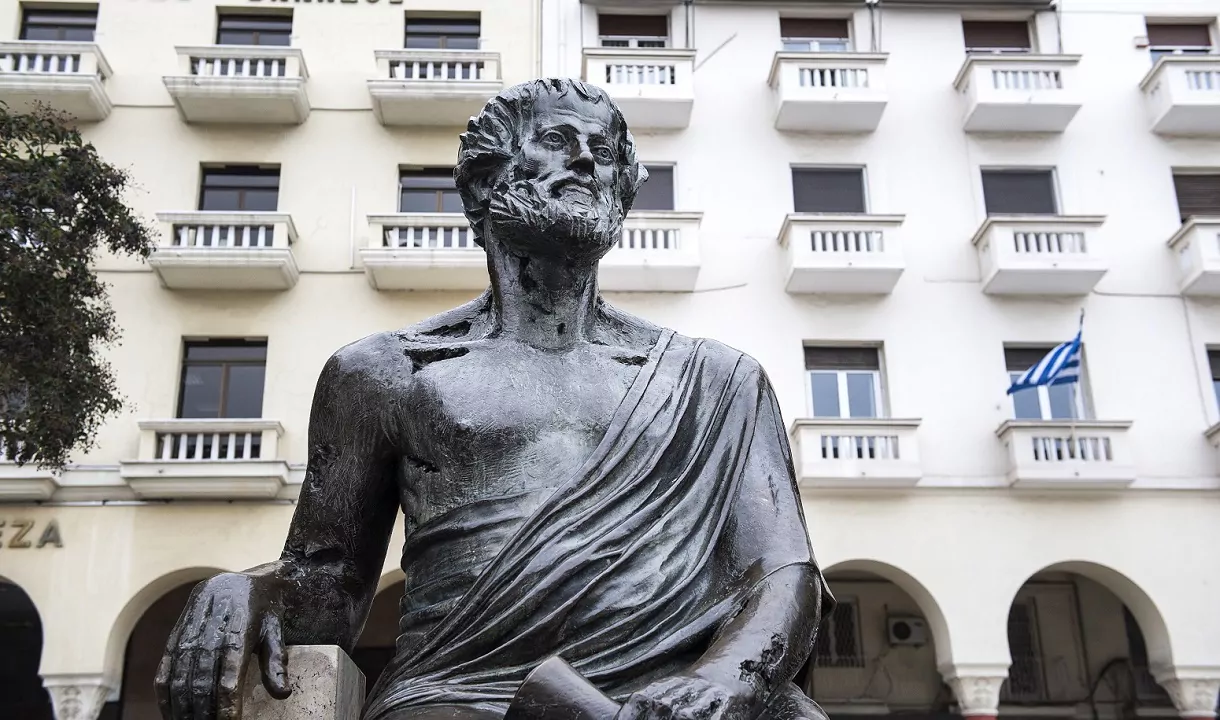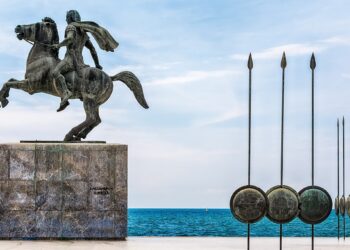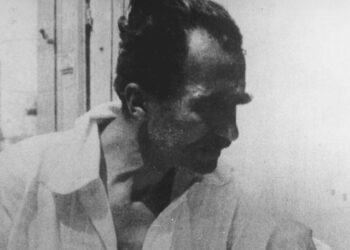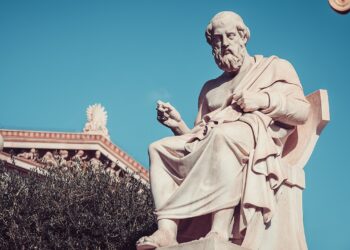If the world had to pick a philosopher who nurtured and influenced Western thought over time, it would be Aristotle. The brilliant Greek thinker, with his Aristotelian cosmos, generously shared his wisdom, elucidating the natural world, and addressing fundamental questions. Aristotle explored the first principles of the world, offering solutions, and even impacting ecclesiastical thought through theologians who adopted parts of his work. Before we examine Aristotle’s quotes that will transform your way of thinking, let’s learn more about the great philosopher.
The remarkable triangular house of Greece surrounded by nature
Aristotle: His life from Macedonia to Athens
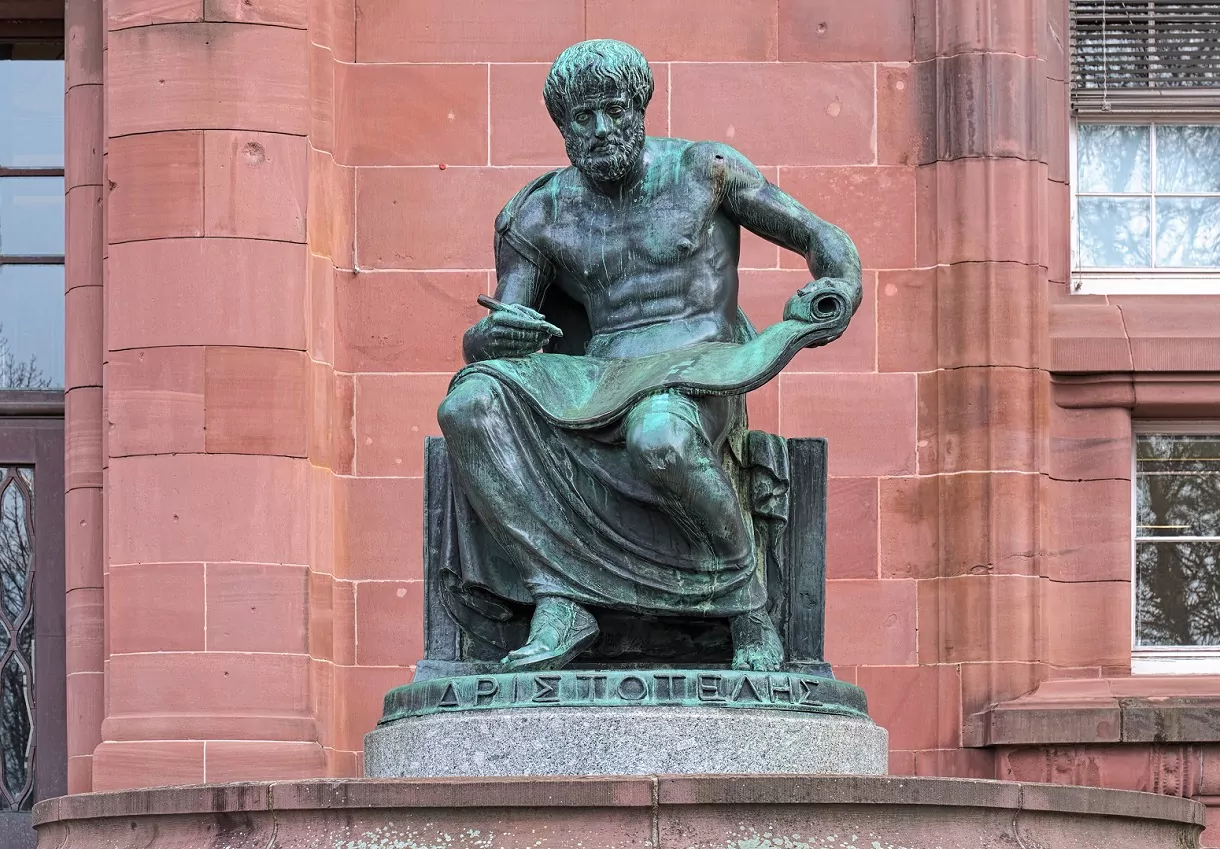
Aristotle was born in 384 BC in Stagira, Halkidiki, the place he later departed for Athens. He was the son of Nicomachus, the physician of King Amyntas III of Macedonia – father of Philip. His parents died when he was young and Consul Atarneus, a family friend and husband of Aristotle’s older sister, Arimnestes, took care of his upbringing. Thus, Aristotle headed to Athens for higher studies, the academic hub of the then world.
He stayed with Plato for almost 20 years. He learned from the logic of his renowned teacher, but at the same time, a field of dispute emerged between Plato and Aristotle. As a result, when his teacher died in 347 BC, the Academy did not appoint Aristotle as the director, although there was no match for him in Athens. Aristotle’s next destination was the city of Assos in Asia Minor and the branch of the Platonic Academy that operated there. Aristotle taught there for three years.
Aristotle’s reputation grew and in 342 BC he accepted the invitation of King Philip II of Macedonia. Thus, Aristotle remained, for 6 years, by Alexander’s side before he became the Great, with Alexander learning in Aristotle’s school the secrets of the world. When Alexander ascended the throne of Macedonia and became king, imposing Macedonian peace on Greek territory, Aristotle returned to Athens to establish his school.
Aristotle stayed in Athens for 13 years, teaching, researching, and writing. It was during this period that he wrote most of his work. Philosophy, mathematics, science, and politics were the fields that Aristotle and his students occupied. The Greek philosopher created a library modeled on the famous library of Alexandria and Pergamon.
The death of Alexander the Great in 323 BC altered the situation for Aristotle as well. The anger of the Athenians against the Macedonians, now that there was no great king of Macedonia, targeted (also) Aristotle. The priesthood accused him of impiety. The foresighted Aristotle had perceived the change of mood in his face. As a result, he did not stay in Athens for his trial. He left for Chalkida. A year later, Aristotle would leave the earthly – but his work would remain forever.
The first editions of his work were made in Rome in 60 B.C. From his remarkable work, 47 complete books have survived, as well as numerous excerpts from others – it should be noted that the history of ideas questions the authenticity of the fragments.
Aristotle’s quotes that will change you

Here is your text with repetitive words replaced by synonyms and rewritten:
“Here are some transformative sayings from Aristotle that could alter your perspective. Incorporating these insights into your everyday existence might bring about a greater equilibrium within you.
Let’s examine these sayings individually…
- [The Greek race] exists autonomously, is governed superbly, and could prevail if it were politically consolidated.
- Wielding authority is an ultimate delight.
- Attractiveness is the most effective endorsement.
- The character of a foolish wealthy individual is the character of affluence.
- Companionship is a spirit inhabiting two bodies.
- Quality work is earned.
- Nobody is a genuine ally to someone who has numerous friends.
- Malevolence and unfairness are deliberate.
- What is aspiration? The dream of a conscious individual.
- Indigence is a deficiency of numerous things, and avarice is a deficiency of everything.
- Patrons cherish recipients more than patrons cherish patrons.
- Nature accomplishes nothing flawed or pointless.
- Upon hearing that someone was ridiculing him, “They can lash me when I’m absent,” he retorted.
- Just as the body perishes when devoid of the soul, so does the city dissolve in the absence of laws.
- The master requires the servant and the servant requires the master.
- Minor expenses obliterate wealth.
- The majority of future occurrences resemble past events.
- In every aspect, there is inherently something divine.
- Nothing bestowed by nature lacks order.
- Poetry is for the intellectual or the deranged.
- Humans are civic creatures.
- Nobody cherishes the fearful.
- There is no distinction between the absence of laws and ineffective laws.
- A woman desires but is incapable.
- The entire worth of wealth lies in its utilization, not in its attainment.
- Courage does not fear an honorable demise.
- What I accomplished with philosophy was to willingly do what others do out of fear of laws.
- The optimal departure from life is like leaving a feast: neither parched nor intoxicated.
Did you know that Aristotle…
… Didn’t exhibit much interest in disseminating his works? He never issued his books, only his dialogues. Consequently, significant works of his were lost. Concerning his work, there is the following paradox: His lost works were composed to be disseminated, while the surviving works were more akin to annotations than intended for publication.
Travel to Greece – Google News – Follow us
Quotes from Onassis that Left a Mark in History
Ancient Corinth: The richest city in the ancient world


